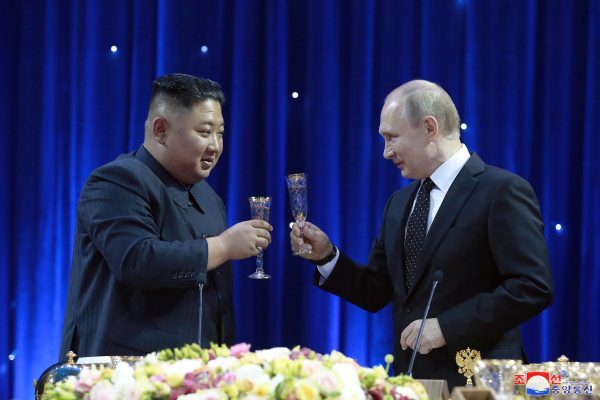Partners in crime

The dissonance between the two conflict-ridden ends of Russia’s periphery continues to shrink as the situation in Ukraine exerts an increasing influence on the security situation on the Korean Peninsula.
The development of North Korea–Russia relations since the beginning of Russia’s large-scale invasion of Ukraine suggests multilateralism aimed at curbing the security threat posed by the Democratic People’s Republic of Korea (DPRK) will come under increasing strain.
The strengthening of DPRK–Russia ties since the beginning of 2022 indicates that Russia may be shifting away from asserting compliance with the UN-based international sanctions regime against Pyongyang. Russia now seems in favour of explicitly violating UN sanctions as a matter of public policy.
The DPRK–Russia relationship had in recent years been amicable if somewhat distant before it ground to a halt due to North Korea’s stringent border closure in 2020. But Russia’s full-scale invasion of Ukraine has brought an outpouring of support from Pyongyang for everything from the invasion itself to the annexation of Ukrainian territory.
While UN member states overwhelmingly condemned Russia’s actions, North Korea has supported them. The Kremlin has since shown an increased willingness to violate UN sanctions against the DPRK.
Since North Korea and Russia vowed to strengthen ties in August 2022, members of the Russian government’s executive and legislative branches have engaged in open discussions over hiring large numbers of North Koreans to work in Russia. That would be a clear violation of UN Security Council Resolution 2270.
The degree to which policymakers in Moscow have begun engaging openly in these conversations is notable. Well into its invasion of Ukraine, the Russian government was still asserting that it abides by UN resolutions regarding sanctions against North Korea.
Prior to the annexation of additional Ukrainian land in September 2022, the Russian government argued that North Korean workers had the right to take employment in Donetsk and Luhansk due to those areas being, in Moscow’s view, independent, non-UN member states.
Such an assertion implies that Moscow still officially maintained the position that allowing them to work in Russia proper would be a violation of international law. The claim that Donetsk and Luhansk were independent states appears to have been a way for Moscow to sidestep the issue of allowing North Korean citizens to work in a Russian-occupied territory.
Still, none of this suggests Russia has made a sudden shift from sanctions compliance to malfeasance. Since the UN laid the latest round of sanctions against the DPRK five years ago, Russia has faced accusations that it has been sidestepping UN regulations governing fuel trade with the DPRK and hiring North Koreans for work purposes.
The March 2022 report from the UN Panel of Experts for North Korea details an accredited North Korean diplomat in Moscow helping the DPRK acquire dual-use materials for its missile program.
The Kremlin has consistently responded to official accusations of sanctions violations — over issues ranging from energy sales to North Korean labourers — by denying such misdeeds. But current discourse in the upper rungs of the Russian government shows a willingness to drop any pretence of maintaining compliance over sanctions. So policymakers will need to prepare for the potential of sanctions violations on a larger and much more explicit scale than ever before.
North Korea and Russia are already under heavy economic sanctions from the United States, the European Union and some US allies in Asia. The most feasible response to North Korea’s security threats is to maintain and expand existing unilateral sanctions to cover all nodes of DPRK–Russia economic cooperation, as well as sanctions circumvention that may be fulfilled with Chinese assistance.
Attempts to counteract Russian moves to upend the multilateral sanctions regime against the DPRK will need to consider China’s role in that regard.
Washington may hold out hope that it can induce China to pull back in its relationship with Russia. After all, China has demonstrated greater willingness than Russia in the past to support UN sanctions against the DPRK. But China and Russia currently appear to be largely aligned in a common desire to upend sanctions against the DPRK, with Moscow taking the lead.
Although unilateral sanctions against Moscow have negatively affected North Korea’s ability to earn hard currency through Russia, Chinese actions have already caused problems for countries attempting to curb Russian aggression in Ukraine through sanctions. In light of this, China, North Korea and Russia could view sanctions-busting as an area for trilateral cooperation.
In the short term, the UN will continue to have a central role in questions over Korean security. This is largely because both Moscow and Pyongyang have used the cover of the UN to justify recent moves toward solidifying their relationship in contrast to international norms.
It is time to prepare for the greater use of unilateral sanctions against Pyongyang while bracing for the veritable collapse of multilateral punitive economic measures against the DPRK. However much North Korea and Russia may attempt to couch recent developments in their bilateral relationship in the legitimacy of the UN, Moscow has shown its hand. It can no longer be trusted to enforce punitive economic measures against North Korea in any meaningful sense.
This article was published by the East Asia Forum.
Anthony Rinna is a Senior Editor at the Sino-NK research group where he analyzes the interactions between Russia and Eurasia and the Korean Peninsula, including economic and security ties.












